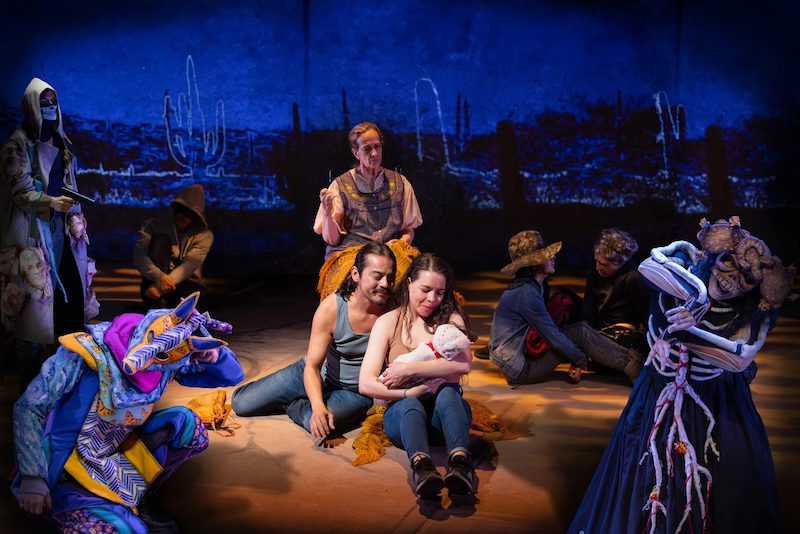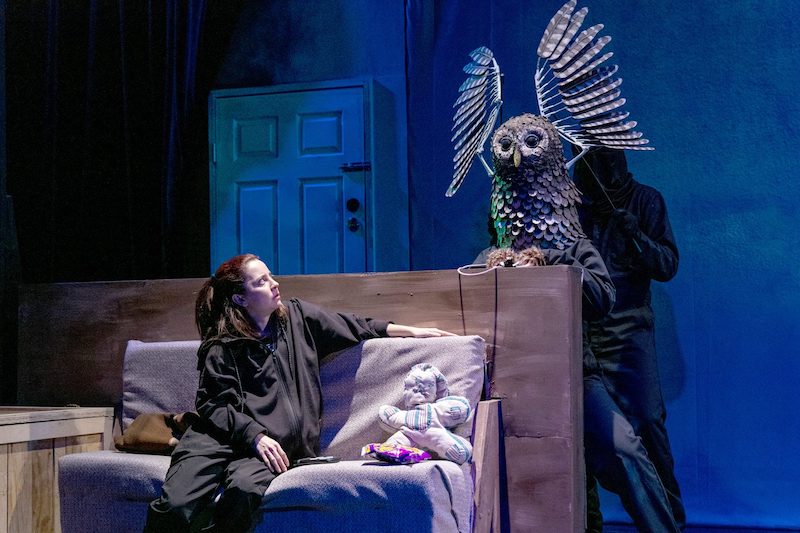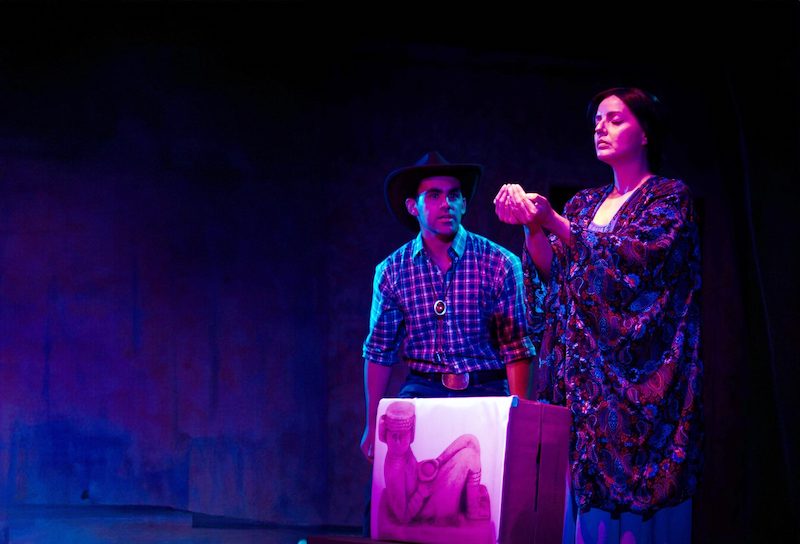
- “A Girl Grows Wings” (Photo by Erika Gómez) Latino Theater Company & Organización Secreta Teatro
The Higher Purposes of the 2024 Encuentro Festival
“Yamel Cucuy” and “A Girl Grows Wings”
By Yazlin Juarez
This article is part of the Stage Raw/Unusual Suspects Youth Journalism Fellowship. Note: the author worked as a marketing associate for Latino Theater Company, which hosted Encuentro 2024
Embedded in the heart of Los Angeles, hundreds of shining stars in the Latiné theater scene glow under a single stained-glass roof.
Over the past three weeks, 19 Latiné theater companies from across the United States and Puerto Rico gathered at the Los Angeles Theatre Center for Encuentro 2024: a national Latiné theater festival. Hosted by the Latino Theater Company, this celebration of artistry marked the 10th anniversary of the company’s first Encuentro and a return to in-person festival performances after their virtual Encuentro in 2021.
Having developed most of my theater education online over the pandemic, this festival was unlike anything I had experienced.
I had the pleasure of working alongside the Encuentro artists as I was working for the festival’s host, Latino Theater Company, as a Marketing Associate. I was running around with a camera, capturing the multitude of plays and convenings running simultaneously in the giant theater complex. As a fly-on-the-marble-wall, I witnessed the reunions of lifelong partners and the birth of new friendships as artists exchanged their methodology and dreams for the future of Latiné theater. Watching these plays and being a part of the festival felt to me like a homecoming. The next Encuentro is scheduled for 2028.
Though I barely made a dent in viewing the wide array of works, I was amazed by the scale and quality of these productions and the variety of talent buzzing in the building. Each company brought a unique offering to the festival with tastes from across the U.S., tackling themes such as racial identity, ageism, disability, and perhaps the most pressing: immigration and the border crisis. While I was impressed with several productions, I was bewitched by a few standout productions whose stories and strengths echo each other: Yamel Cucuy, devised by Glass Half Full Theatre of Austin, Texas and A Girl Grows Wings, developed and devised by Organización Secreta Teatro from Mexico City. Both pieces feature young undocumented girls whose opportunities –and in Yamel’s case, her very life – are cut short, and must go on a spiritual journey to find their inner strength.
These productions were mesmerizing and multidimensional in their use of original scores and otherworldly costumes incorporating Mexican folklore and Mesoamerican mythology into social justice advocacy. Blending modern narratives of border crossing with ancient myths of the descent into Mictlan, the Aztec land of the dead, these stories created hair-raising paths for their protagonists to face their demons and grow wings.
Glass Half Full Theatre joined the Latino Theater Company for their first Encuentro, bringing their signature puppetry, inventive strategies, and social justice messaging to Encuentro. Yamel Cucuy was written by company members Gricelda Silva, Indigo Rael, and director Caroline Reck.
Yamel Cucuy and A Girl Grows Wings have become even more timely in our political landscape since Donald Trump’s reelection as U.S. president. Most recently, Trump has proposed Tom Homan, former U.S. Immigration and Customs Enforcement acting director, to be his “border czar,” in charge of the mass deportation of undocumented immigrants. The president-elect has even threatened to revoke citizenship from U.S.-born citizens to deport entire families, striking fear in the hearts of countless Latino immigrants and allies across the nation. In Yamel Cucuy, Trump’s band of bigoted extremists have become modern-day cucuys – Spanish for bogeymen.
Before Yamel (Diana Guizado) and her brother Xavi (Gustavo Martinez) flee Mexico, their mother sings her a farewell lullaby, warning her to be good and hide from the cucuys that seek to take her away. After ICE raids her family’s apartment, Yamel hides in the fridge and dies tragically; however, the cause of her death fluctuates through visions of herself in the fridge and being detained in ICE custody. She is then guided to Mictlan, the Aztec underworld, by the trickster spirit, El Chupacabron (Gustavo Martinez). This wise-cracking creature is the coyote in this border-crossing analogy and a mirror image of her brother Xavi. Yamel is also visited by: La Lechuza (Veronica Pomata), an ancient witch and owl spirit; El Viejo con El Saco (Victor Santos), a symbol for the child-snatching ICE agents; and Las Lloronas (Minerva Villa), a three-headed interpretation of the legend, identifying as oppressed Mexican women throughout history. These characters are the shining jewel of the production thanks to the bone-chilling costumes by Annie Ulrich and puppetry by Reck.
Yamel Cucuy brings comfort to the scared, young Mexican-American women reckoning with the state of politics and the ever-present challenge of misogyny. Rather than cower in fear and follow the narrative, the strong-willed protagonist rejects her destiny and encourages other young women to take back their power and stand their ground. In the end, Yamel earns her place among the pantheon of Mexican folkloric spirits as “Yamel Cucuy,” and uses her powers to protect the youth, rather than terrorize them.
A Girl Grows Wings follows many of the same beats as Yamel Cucuy, but stands out with its own vivid imagery and interpretation of the border-crossing tale. The play was created by writer Marisela Treviño Orta, a member of the Latino Theater Company’s playwright commissioning initiative, the Circle of Imaginistas. Tasked with writing about the Deferred Action for Childhood Arrival (DACA) community, commonly known as Dreamers, Orta crafted a wordless play working alongside Organización Secreta Teatro.
DACA was enacted by the Obama administration in 2012, allowing undocumented immigrant children to remain in the United States. The policy has been challenged in court several times and is no longer accepting applications, but for now, the current Dreamers still retain their DACA status, stuck in a legal limbo.
A Girl Grows Wings marks the third co-production between the Latino Theater Company and Organización Secreta Teatro, following Pueblo Espíritu and Las Diosas Subterráneas. The company, directed by Rocío Carrillo, is a laboratory dedicated to scenic poetics and social justice, trademarked with Carillo’s love for mythology.
After fleeing her native Chiapas to the U.S., Alma (Stephanie Izquierdo) grows up believing she can achieve the American dream until she discovers her DACA status and loses her “wings” – access to professional opportunities, social capital, and even her safety. Live sound design by Paula Bucio immersed audiences in Alma’s journey, transporting us from the dusty desert to the intimidating United States, then to the unruly realm of Mictlan. After journeying to the Aztec spirit world, the rest of the cast don custom masks and headdresses to create a thrilling pantheon of Mesoamerican deities, including Xochipilli (Ernesto Lecuona), god of music, and Mictecacihuatl (Brisei Perez Guerrero), goddess of the underworld. Alma learns to speak the languages of the gods through primal, poetic movements which give her the courage to stand up for herself and advocate for the rights of Dreamers.
My one issue with the play comes from the few words spoken and written in the performance. The play opens with a single chair and projections on dual screens with a prologue, originally featured in the playbill of the production’s Mexico City release. It provides a brief legal history of the DACA community and their aspirations in English and Spanish. While it has good intentions, the content is slightly inaccurate, suggesting that Dreamers are “activists that seek the legalization of all immigrants.” Given that the play has been accompanied by panels on the DACA community by legal defenders, I think this nuance is vital in the representation of Dreamers. This follows the most recent hearing at the Fifth Circuit Court of Appeals on October 10th –coinciding with the U.S. premiere of A Girl Grows Wings– in which DACA was challenged as unconstitutional.
These two productions create ethereal and endearing characters based on imagery from the Latino community’s Indigenous roots. In a similar vein, Stoneheart, another festival entry, by Camino 23 also portrays troubled young Mexican women who look to Aztec deities and rituals to reclaim their power. The scene in which Patli, the Mexican incarnation of La Llorona, sacrifices her children to Chalchiuhtlicue, the Aztec goddess of water, echoes Stoneheart’s protagonist Birdie Zermani’s ritual to Tlaloc, the god of rain. In the end, they are both swept away by a flood of tears – literally – and reckon with the weight of their actions.
Yamel Cucuy and A Girl Grows Wings are among the emerging canon of theater pieces that incorporate Mesoamerican mythology to connect with their Indigenous heritage, reminiscent of the Chicano movement’s “return to Aztlan.” This revitalization of pre-Colombian culture asserts that “no human being is illegal” and “we didn’t cross the border, the border crossed us.” With this reemergence of our ancient past, comes the controversial history of human sacrifice and rituals. This can be a tricky subject to translate to stage considering the existing stereotypes in media that depict Aztecs/Mechicas and polytheistic Indigenous peoples as bloodthirsty and superstitious. However, Yamel Cucuy, A Girl Grows Wings, and Stoneheart provide space to analyze the complex culture behind the stereotypes and encourage young women to awaken their inner gods.
















